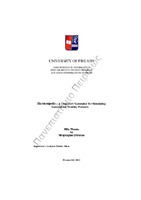Hermoupolis: a trajectory generator for simulating generalized mobility patterns

View/
Abstract
The real-world process of generating a large spatio-temporal data set performs a very challenging problem. From the one hand it is a very expensive process, requiring sometimes state of the art software tools and very complicated hardware (sensors, servers, GPS infrastructure etc.); while from the other hand the recorded trajectories sometimes cannot represent any special traffic or movement patterns since they refer to specific vehicles or people that cannot be easily integrated to groups. thus there seems to be a serious need for large amounts of real life mobility data To achieve this, a big number of moving object generators have been developed, in order to help even people that are not familiarized with the virtual creation of such objects, to evaluate their performance, in general, through their mobility patterns. This thesis tries to compare the previous work on data generators, analyze them and propose a modern data generator that among its other common features can generate "enriched» (semantic) trajectories which are derived from a given general semantic scenario and follow real life mobility patterns.

